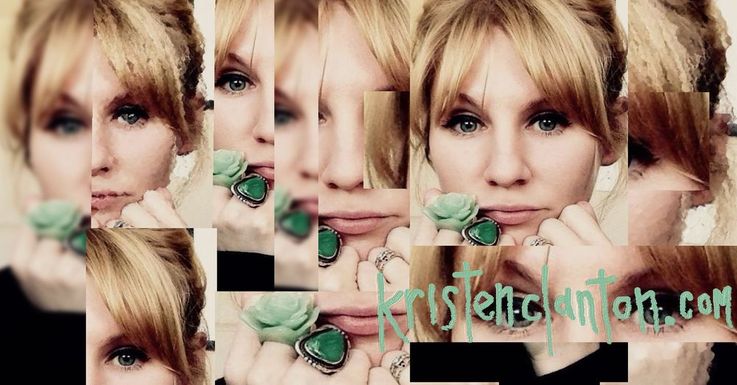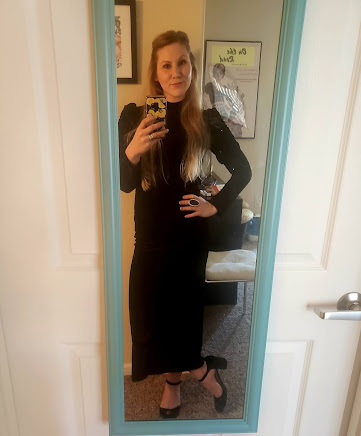It is 5 am, and a pretty good blizzard is on the way to town. I usually wake up at 5 am, which means Evelyn usually wakes up at 5 am. If I am not up, she kicks me-- slowly-- like she's stretching out her arms and legs-- testing their length and strength before she really gets moving. At 5 am, I usually read for an hour, turn the lamp on beside my bed, pull my sweater up so the full globe of my belly is in the golden light, and I imagine Evelyn inside there, looking around in soft-fuzz wonder, her awareness growing more and more every morning I turn on the golden lamp.
But today is the day after Thanksgiving, and Tim and Langston are still sleeping, Christmas trees lit in the bedrooms, so all the light is kalidoscopic against all the dark. Mornings like this, Evelyn and I usually draw a bath and read for an hour, sometimes emptying the tub half way to warm the water again, my belly a giant island where my book sits. We would usually stay in the bath until Tim wakes up and asks if I want a cup of tea, then we'd climb out and crawl back into bed, back to the golden lamp and stacks of warm blankets, and watch the sunrise through the windows. But this morning, that pretty good blizzard is on the way and will stay here until Sunday; Evelyn is due to arrive in four days, and though she doesn't strike me as a baby who'd be born in a blizzard, I wouldn't fully put it past her. It is also almost the end of the year, so I suppose this morning I thought to write here for the first time in ages, mostly about that. Mostly about Evelyn.
Langston came about like a lightning bolt. Tim and I got married and planned on waiting a few years to have a baby. And I don't know what happened really. I married Tim, and automatically, I saw Langston's face perfectly. I knew Langston was supposed to be there, and then he was. He pounded into the world immediately, all strong legs and long arms. We named him Langston, which means,
tall man's town.
The bringing on of Evelyn is very different. We waited for her for years. I mean years and years. In March of this year, I remember being in a beautiful hotel room in Portland, Maine. It was raining and cold, but we could see the ocean. I remember finally giving up the ghost. After the years of waiting for Evelyn and all the medical tests, the months and months of heart-crushing disappointment, I told Tim I couldn't do it anymore. That maybe we could go back to trying after a few months, but that it couldn't be my focus anymore. We decided to stop trying for the year, and for the year, I would put all my focus into writing. That sounded real nice.
And I had no idea that when that absolute decision was finally reached, I was pregnant.
I found out I was pregnant on Good Friday. For a couple weeks, Tim had asked me to take a pregnancy test, and I said no, I said I couldn't take seeing a negative again and that there was no way I was pregnant, even though my belly was soft and I was nauseous all the time. I finally took the test on Good Friday, and it was positive. I still didn't fully believe it. So when I saw my doctor the following week, and I was lying belly-up on the sonogram table, I was scared my belly would be empty.
But there she was. All little and quiet and nine weeks hibernating, waiting for me to come to the door.
Tim will tell you that when I was pregnant with Langston, I not only knew-- weeks before the tests told-- that he was there, but I also knew he was Langston, fully and completely. I like this story. I like to believe I immediately became tapped into that perplexing, psychic aspect of motherhood, being part of the divine Mary, but I am not so sure if that's true. If you would've asked before Evelyn came to town, I would have proudly said,
yes, yes, of course. I would've tousled Langston's hair, and he and I would've exchanged the same knowing look we've exchanged since the first moment, in the hospital, when he opened his eyes and looked at me.
But after this year, I think part of my divine Mary was absolute fear. I was terrified of having a little girl because I knew having a little girl would change me in ways I was not ready for.
This is probably going to be the part of all this that's difficult to write, and not just because of the meaning and point, but also because of the language needed.
The thing about being a kid is that we are still not only learning the world, but we are also learning how to translate it. The things that make us happy-- the things we see in the TV sitcoms and on cartoons, the things we read to our brothers and sisters from our Little Golden books-- are easy to understand. We see the same pictures of happiness, hear the same words of happiness, so as kids, we can easily point to those moments and call them happiness. But the dark parts of childhood are far, far more difficult to understand. And the really dark parts, the parts that are singular-- and you're too young to realize you're in an extreme exception and not a rule-- are impossible to translate. The truth is, as a kid, you feel your way through those dark parts. There are no words. There are just colors and feeling.
If those dark parts go on long enough, eventually we learn the words. We've read different books, we've watched different sitcoms, we've overheard the wrong conversations. At this point, when we finally extract the language, it isn't a
eureka! moment. It has been too long. Think of how long that shift in consciousness takes. The years that shift in consciousness takes. When you're a kid who goes from color and feeling to full-fledged words, the
eureka! moment is the knowledge that you are alone.
I remember the very moment I made it past the colors and feeling and was sunk straight into their meaning. It was right before Christmas. It was dark and after dinner. I was cold and outside, sitting on the wooden swing in my grandparents yard. I didn't have my windbreaker, but I didn't want to go inside. I could see the blue glow of the TV through the curtains of the picture window. I was little and quite, a small blonde mouse, a still stone, hibernating in one spot.
The thing about this, the thing about being a kid and being alone in color and feeling, then finally getting to the language of things, is that the weight was heavy in all those colors, but when the feeling makes its way to words, it is impossible to carry. The real bad part of moving through that though, is the end reasoning: I am alone. There was no one to give my words to. I was nine-years-old. It was almost Christmas. And I really, really wanted a gold necklace for Christmas. But it was the first time I knew the difference between a want and a need. There was something I really needed.
So I talked to God. Did I ever. I begged God. There were so many reasons I could come up with for what was happening.
And if I am completely truthful, I have been stuck in that moment my whole life.
All of me, since then, has still been nine-years-old and without a coat, talking to God from the perspective of a child. As a parent to Langston, I could consciously separate myself so far. I've spent all of Langston's life consciously giving space to our communication and openness, consciously working to parent him outside of my own hang ups, in a lot of ways growing past my own childhood. Before Evelyn, if you would've asked me if this is what I was doing, I am not sure what I would've said.
I think I would point to distance. I would show you the map between Florida and South Dakota, show you the miles, the days it would take to walk. I may have nodded to Tim and Langston. their thick coats and bright eyes, their lopsided smiles and ease. I may have told you the factual bullet points between here and there. Told you I went to college, attained an advanced degree. That I am a teacher, a reader, a parent. Bold nouns as buoys.
But then quiet little Evelyn came to town and everything changed. Evelyn means
wished for child. It means
little bird or
beautiful bird.
The things I learned from being a mother to Langston are easy to define. He made me strong. He made me realize I can do exactly what I say I can do, that I can always find the path, I can love and understand deeply. The things I'm learning from Evelyn, at this point, are more difficult to define. Evelyn has made me recognize the difference between the woman I am now and the little girl I used to be. Evelyn has brought out the colors and the feelings. She's brought out the language, she's dragged in all the good books I used to grow up.
But the big thing, the impossible-to-ignore thing that Evelyn brought me is myself. I can still see the little girl, right before Christmas, sitting outside and talking to God, but I can also see who I am now, as a woman, a mother and a teacher, walking down the path to that nine-year-old girl. Seeing how small she is, how complicated her sadness is. Who I am now would do anything to help her.
And one of the big things I've been able to do this year is see this for the first time in my life. If Langston, my tall man's town, cut the path and held my hand through it, then Evelyn, my little bird, is the one who has made me realize who I am in the story.
I don't think she is the kind of baby to be born in a blizzard, but just in case, I am happy I got to write all this out before the hour.





























